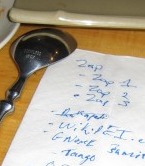Copy Goes Here, a great short film from Coudal Partners (requires QuickTime)
Year: 2005
Beautiful visualizations of flight patterns (found via Digg)
Live From the Formosa Session #5 and Zap Your PRAM 3
 Good friends Peter, Dan and I have recorded another session of Live from the Formosa Tea House. Basically, we record our lunch time conversation and put it online.
Good friends Peter, Dan and I have recorded another session of Live from the Formosa Tea House. Basically, we record our lunch time conversation and put it online.
We got off to a rough start, but once things got rolling, we had a great conversation. This time we discussed the upcoming Zap Your PRAM 3 conference (don’t worry, you didn’t miss Zap 2, it didn’t happen).
Peter put together shockingly good show notes for our fifth episode of Live From the Formosa Tea House. I laughed out loud at several points during the showing – that must be a good thing.
Apple gets all the credit for slick computer design, but damn, IBM knows how to make a bad-ass-lookin’ super-computer
The Long Now Foundation website has had a nice re-design
Announcing the Swat Web Application Toolkit
Over at in the silverorange Labs today, we announced our first open-source project. Swat is a web application toolkit build on PHP5. It’s not totally x-treme or all web-twenny. Rather, it’s a solid (or at least “solidifying”) toolkit containing many of the widgets we use to build web applications.
We’ve had a few generations of our own in-house web toolkit, first in Cold Fusion, then PHP. This time around we’ve used an open-source license for the code, and at least as important, an overall approach to the development that is based on those generally found in the world of open-source software.
I’ll try to answer a couple of questions I expect we’ll get:
- Does it use Ajax?
- Sort of, kind of, not really. We have a package that runs along side of Swat for any XMLHttpRequest stuff we might need. None of the current Swat widgets use it by default, but it will be easy to extend in that direction. We’re going to be careful to only use these technologies where appropriate and in a way that degrades gracefully.
- Why didn’t you just use Ruby on Rails?
- We looked at every web application framework we could find. Some, like Ruby on Rails, were quite good (there’s a lot of crap too). However, we have enough of an application base that we can justify the support of our own toolkit. This also let’s us build on the concepts we’ve established in the previous iterations of our formerly proprietary toolkits.
Back in our days programming in ColdFusion, we ran into the perils of working with a platform that makes the easy things really easy and the hard things really hard. We’re doing our best to make something that will be as useful in a powerful and complex (if need be) application as it would building a simply weblog engine.
The toolkit is only a few months old, but we’re already reaping the benefits in our development process at silverorange. There’s more info in the announcement and you can find all the other goodness (Subversion repository, mailing lists, documentation, jabber chat, etc) from the Swat website.
Our provincial government has released a wind atlas of Prince Edward Island (see the CBC story)
Announcing the Tango Project: Making Open-Source Software Beautiful
Today at the Gnome Summit in Boston in the MIT Stata Centre, Jakub Steiner of Novell and I announced the Tango Project. We’ve been working on it for a few months now, just getting the basics figured out before we started bragging.
The Tango Project is a collaborative effort of a variety of free/open-source software designers and artists to work towards unifying the visual style of the free (mostly Linux) desktop.
To start, we have:
- Base Icon Library – Most of the work here has been done by Jakub Steiner. It’s a beautiful icon set that aims to be relatively at-home on Windows, Mac OS X, and define a strong base style for the Linux desktop.
- Style Guide – A work in progress, the Tango style guide works to create a color scheme and other key visual guidelines for creating Tango-style icons.
- Standard Icon Naming Specification – Rodney Dawes has done much of the work to get a common icon naming specification to make it possible to create an icon theme that can work on a variety of different platforms (Gnome, KDE, etc.). There are utilities to map the new Tango icons to the existing icon names on current Gnome and KDE systems.
It’s been fun to participate on the Tango project. I hope others join us and help make the free desktop (more) beautiful.
Long Now Foundation Seminars
Stuart Brand’s peculiar Long Now Foundation has been hosting a series of seminars on long term thinking in the San Francisco area over the last couple of years. The list of speakers is impressive and most of the talks are available for download in Ogg Vorbis or MP3 format.
Particularly good talks include Roger Kennedy’s Political History of North America from 25,000 BC to 12,000 AD (Ogg Vorbis, MP3) from which I learned for the first time of the remarkable Pyramid-like structures in Illinois. Paul Hawken also gives a great talk (Ogg Vorbis, MP3). I had the pleasure of hearing Hawken speak here in Charlottetown a few years ago where he chided us for having potatoes from California in the local supermarket (our province is famous for it’s local potato production).
The latest talk (just last week) is by Ray Kurzweil (Ogg Vorbis), who’s ideas I wrote about in the early days of this weblog.
The series is worth following and the foundation does a great service in its organization and free online distribution.
Find the term “Web 2.0” embarrasing? Me too – so we call it “web twenny”

